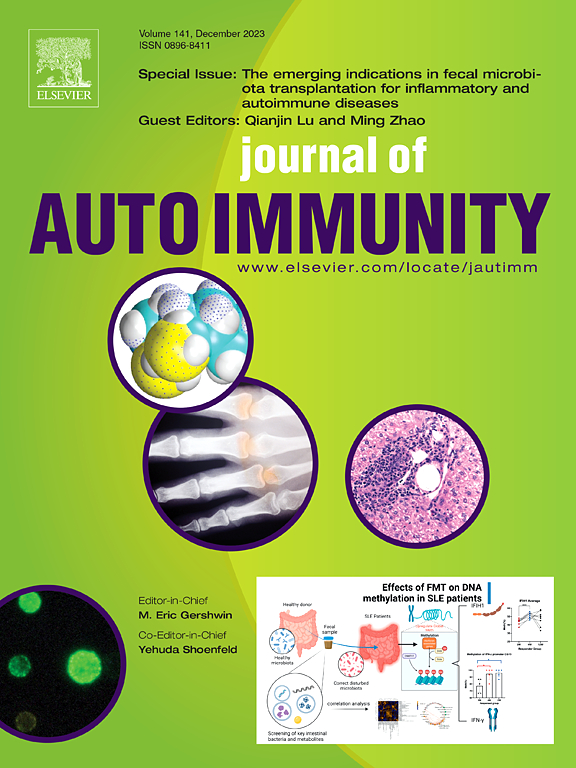STAT3 phosphorylation in the rheumatoid arthritis immunological synapse
IF 7
1区 医学
Q1 IMMUNOLOGY
引用次数: 0
Abstract
Targeting the JAK/STAT pathway has emerged as a key therapeutic strategy for managing Rheumatoid Arthritis (RA). JAK inhibitors suppress cytokine-mediated signaling, including the critical IL-6/STAT3 axis, thereby effectively targeting different aspects of the pathological process. However, despite their clinical efficacy, a subset of RA patients remains refractory to JAK inhibition, underscoring the need for alternative approaches. Here, we identify a novel JAK-independent mechanism of STAT3 activation, which is triggered by the formation of the immunological synapse (IS) in naive CD4+ T cells. Our data demonstrates that LCK mediates the TCR-dependent phosphorylation of STAT3 at the IS, highlighting this pathway as a previously unrecognized hallmark of early T cell activation. Furthermore, we show that the synaptic LCK/TCR-STAT3 pathway is compromised in RA. This discovery highlights a new therapeutic target for RA beyond JAK inhibitors, offering potential avenues for treating patients resistant to current therapies.
类风湿关节炎免疫突触中STAT3的磷酸化
靶向JAK/STAT通路已成为治疗类风湿关节炎(RA)的关键治疗策略。JAK抑制剂抑制细胞因子介导的信号传导,包括关键的IL-6/STAT3轴,从而有效地靶向病理过程的不同方面。然而,尽管它们具有临床疗效,但一部分RA患者对JAK抑制仍然难治,这强调了替代方法的必要性。在这里,我们发现了一种新的不依赖于jak的STAT3激活机制,它是由初始CD4+ T细胞中免疫突触(is)的形成触发的。我们的数据表明,LCK介导IS的tcr依赖性STAT3磷酸化,突出了这一途径作为早期T细胞激活的一个以前未被认识的标志。此外,我们发现突触LCK/TCR-STAT3通路在RA中受损。这一发现强调了JAK抑制剂之外的RA新的治疗靶点,为治疗对当前疗法有耐药性的患者提供了潜在的途径。
本文章由计算机程序翻译,如有差异,请以英文原文为准。
求助全文
约1分钟内获得全文
求助全文
来源期刊

Journal of autoimmunity
医学-免疫学
CiteScore
27.90
自引率
1.60%
发文量
117
审稿时长
17 days
期刊介绍:
The Journal of Autoimmunity serves as the primary publication for research on various facets of autoimmunity. These include topics such as the mechanism of self-recognition, regulation of autoimmune responses, experimental autoimmune diseases, diagnostic tests for autoantibodies, as well as the epidemiology, pathophysiology, and treatment of autoimmune diseases. While the journal covers a wide range of subjects, it emphasizes papers exploring the genetic, molecular biology, and cellular aspects of the field.
The Journal of Translational Autoimmunity, on the other hand, is a subsidiary journal of the Journal of Autoimmunity. It focuses specifically on translating scientific discoveries in autoimmunity into clinical applications and practical solutions. By highlighting research that bridges the gap between basic science and clinical practice, the Journal of Translational Autoimmunity aims to advance the understanding and treatment of autoimmune diseases.
 求助内容:
求助内容: 应助结果提醒方式:
应助结果提醒方式:


